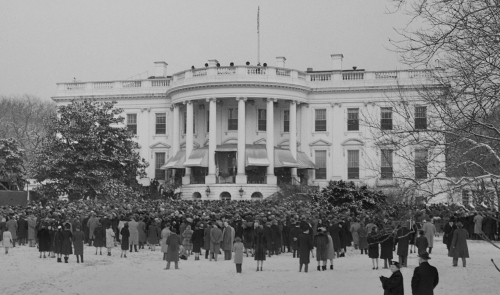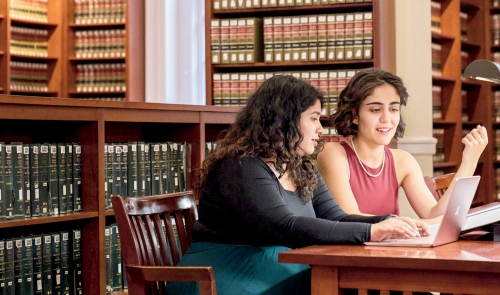Legal Theory, History, & the Social Sciences

Areas of Interest
NYU Law has a cadre of full-time faculty who make law and economics a primary focus of their work. Their approaches to economic analysis are diverse: theoretical, quantitative, empirical, and experimental. Several of our faculty are lawyer-economists, and a number of them hold leadership positions in the Society for Empirical Legal Studies and the American Law & Economics Assocation. Some, such as Lewis Kornhauser, have played central roles in the development of Law and Economics as a field.
Several centers and institutes are led by Law and Economics faculty. The Center for Law, Economics, and Organization promotes interdisciplinary research and teaching in law and economics. Its director, Jennifer Arlen ’86, is a leading proponent of empirical analysis of legal issues, as is Geoffrey Miller, who also co-directs the Program on Corporate Compliance and Enforcement with Arlen. Scott Hemphill, whose research focuses on the law and economics of competition and innovation, is a faculty director of the Engelberg Center on Innovation Law & Policy. Dean Emeritus Richard Revesz, an expert on cost-benefit analysis, directs the Institute for Policy Integrity. Stephen Choi, whose research interests focus on the theoretical and empirical analysis of corporations and capital markets, is director of the Pollack Center for Law & Business.
The depth of scholarship in law and economics is further increased by affiliated and visiting faculty. Portfolio manager Alan Rechtschaffen teaches Financial Instruments and the Capital Markets, and leading economists, such as Daniel Rubinfeld, Alan Auerbach, and Alan Viard, participate in the intellectual life of the Law School, as do faculty from NYU’s Stern School of Business. Scholarly ideas are also regularly exchanged by all at the Behavioral Economics and Public Policy Workshop, the Law & Economics External Workshop, and the Law & Economics Workshop.
The economic analysis of law is taught throughout the standard curriculum as well as in advanced courses and several colloquia. There are the Colloquium on Law and Economics; the Colloquium on Law, Economics, and Politics; the Innovation Policy Colloquium; and the Tax Policy Colloquium. NYU School of Law students can also cross-register for courses within the economics department, the Stern School of Business, the Department of Politics, and the Wagner Graduate School of Public Service.
The Law School offers joint degrees in law and economics, as well as fellowships such as the Lawrence Lederman Fellowships in Law and Economics, the Furman Academic Fellowship Program, and the Wagner Fellowship in Law & Business.
NYU Law has long had a very distinguished program in legal, moral, and political philosophy that has greatly influenced the way law schools across the country teach this complex interdisciplinary field of study. The intellectual values and programmatic innovations of its founding figures, the great philosophers Ronald Dworkin and Thomas Nagel, are evident throughout the curriculum and in the work of the Center for Law and Philosophy.
Anthony Appiah, Sophia Moreau, Liam Murphy, Samuel Scheffler, and Jeremy Waldron, are now the public faces of this program. They are complemented by a faculty with a wide range of specialties. Among the other full-time faculty with strong philosophical expertise are Mark Geistfeld, David Golove, Moshe Halbertal, Stephen Holmes, Robert Howse, Lewis Kornhauser, Mattias Kumm, David Richards, and Katrina Wyman. The Law School has also hosted a number of distinguished legal philosophers as part of its Hauser Global Law School Program, including, in recent years, David Dyzenhaus, Wojciech Sadurski, and Kristin Rundle.
NYU Law’s curriculum offers a selection of legal philosophy courses that presents more choice and opportunity than other top law schools. Students can choose from a three-tiered structure of courses, seminars, and colloquia. The first tier consists of a series of introductory lecture courses about jurisprudence or legal philosophy, moral philosophy, and political philosophy. The second tier involves more specialized courses and seminars, such as The Rule of Law, Theories of Discrimination Law, Private Law Theory, Modern Legal Philosophy: The Books,and Human Dignity, among many others. Co-taught seminars are quite common. For example, in the spring of 2026 Moreau and Murphy will teach a new seminar on the philosophy of free speech and academic freedom.
The third tier is the Colloquium in Legal, Political, and Social Philosophy, offered every fall. This is both a course that students take for credit and the main regular public academic event of the program in Law and Philosophy at NYU. The Colloquium brings in distinguished speakers who present papers in moral, political, and legal theory, and are then are subjected to challenges and questioning from faculty and students. Guests regularly include the most prominent and innovative moral, political and legal philosophers of the day; a special effort is to maintain diversity across a number of dimensions, including subject matter. The Colloquium attracts, in addition to students taking it for credit, faculty from the law school, faculty from other schools and departments at NYU, and faculty from other law schools and philosophy departments in the New York area.
The law and philosophy program is also distinctive for maintaining very close ties with NYU’s Department of Philosophy. Graduate courses in the Department of Philosophy are frequently cross-listed at the Law School (Moral Obligations Under Conditions of Injustice being a recent example) and LLM and JD students (with permission of the instructor and the vice dean of the law school) can take Philosophy courses for credit even when not cross-listed. Many members of the Philosophy faculty, such as Juliana Bidadanure (who is an interdisciplinary affiliate of the Law School), Sandford Diehl, Miranda Fricker, and Sharon Street are frequent attendees at the Colloquium, as are the political theorists Melissa Schwartzberg (also an interdisciplinary affiliate of the Law School) and Ryan Pevnick from the Department of Politics. The Law School offers a JD/MA or PhD in Philosophy jointly with NYU’s Graduate School of Arts and Science.
The study of law is deeply intertwined with the democratic political process and the institutional structure of government. What makes NYU Law exceptional is the breadth and depth of expertise in political science and related disciplines that the faculty brings to exploring the law-politics interface. A comprehensive survey of interdisciplinary research and teaching at the intersection of law and politics would include empirical and theoretical investigations of Congress, the presidency, courts, and bureaucracy; the political economy of state and local governments; international relations, global governance, and the comparative study of political institutions; liberalism and its critics; democratic theory; and much else. Here are just a few of the interdisciplinary currents coursing through the faculty and classrooms of the Law School:
The Colloquium on Law, Economics, and Politics, led by John Ferejohn and Lewis Kornhauser, brings law faculty together with social scientists from NYU and other universities to engage with cutting-edge interdisciplinary work focused on the positive theory of political institutions and quantitative analysis. One of the leading political scientists of his generation, Ferejohn has produced scholarship central to the development of positive political theory and its application to the study of legal and political institutions. Kornhauser, a leading legal economist, has done pathbreaking work on judicial decisionmaking, including a series of important articles with Princeton political scientist Charles Cameron, who is a regular visitor at the Law School.
A number of other NYU Law faculty also pursue the interdisciplinary study of political institutions from various angles. The author of an acclaimed book on the politics surrounding the Supreme Court throughout American history, Barry Friedman is working with a group of political scientists to develop a trailblazing course and casebook on judicial decisionmaking that marries the most sophisticated work in the social sciences with normative and institutional legal questions. Dean Emeritus Richard Revesz, a leading scholar of regulatory law and policy, has done canonical work at the intersection of law and political science on judicial ideology and panel effects and the political economy of environmental regulation. Adam Cox and Ryan Bubb are prominent examples of a younger generation of NYU Law faculty who are producing theoretical and empirical studies of political institutions in conversation with both lawyers and social scientists.
The legal framework of democracy
Samuel Issacharoff and Richard Pildes are largely responsible for creating the interdisciplinary field of the Law of Democracy. Their influential course and casebook explores legal and policy issues concerning the structure of democratic elections and institutions, such as the role of money in politics, the design of election districts, the regulation of political parties, the design of voting systems, the representation of minority interests in democratic institutions. Beyond this, Pildes has written extensively on the rise of political polarization in the United States, the dysfunction of America’s political processes, and the “romanticization” of democracy in this country. Issacharoff’s most recent book, Fragile Democracies: Contested Power in the Era of Constitutional Courts, is a major comparative assessment of the role of courts in countries making the transition to democracy. A further bridge between academia and the real world of law and politics comes in the person of Robert Bauer, former White House counsel to President Obama, election law expert, and now Professor of Practice and co-director of the Legislative and Regulatory Process Clinic.
International relations and global governance
In NYU Law’s leading program in international legal studies, social scientific and theoretical approaches to the study of politics play out on the global stage. Colloquia in Global and Comparative Public Law, Institute for International Law and Justice, and Law and Development bring a steady stream of interdisciplinary scholars to the Law School. Ryan Goodman writes about human rights, the law of armed conflict, and US national security law from an interdisciplinary perspective and co-directs the Reiss Center on Law and Security, a non-partisan research institute focused on cultivating an informed dialogue and conducting groundbreaking research on important national security issues with Samuel Rascoff. Globally prominent scholars Joseph Weiler, Gráinne de Búrca, and Mattias Kumm explore the law and politics of the European Union.
Political theory
The NYU Law faculty boasts a number of eminent political theorists. One of the foremost legal and political philosophers in the world, Jeremy Waldron has published numerous books and articles on theories of rights, constitutionalism, the rule of law, democracy, property, dignity, hate speech, and international law. A leading theorist of political liberalism, Stephen Holmes has written widely about the disappointments of democratization after communism and the difficulty of combating terrorism within the limits of liberal constitutionalism. Moshe Halbertal is a wide-ranging scholar of philosophy, political theory, and Jewish thought who has authored significant books on sacrifice, idolatry, and Maimonides. The latest addition to this illustrious group is Anthony Appiah, a leading moral and political philosopher and one of the nation’s best-known thinkers on race and society.
Law students interested in studying political science can take up to 10 credits from the NYU Department of Politics. The Law School also offers a JD/PhD program in politics and law.
The relationship between society and law is a complex and intriguing one, so it’s not surprising that at NYU Law it is viewed through the lenses of multiple disciplines—criminology, sociology, and anthropology, to name a few.
The Law School has several faculty who have PhDs in sociology as well as law degrees, such as David Garland and Ryan Goodman. Garland is widely considered to be one of the world’s foremost sociologists focusing on crime and punishment. Goodman, who served as the special counsel to the general counsel of the Department of Defense from 2015-16, has published articles in leading law reviews and has also co-authored several books, including Socializing States: Promoting Human Rights Through International Law.
Other faculty whose scholarship focuses on law and society include Carol Gilligan, a leader in feminist theory and the author of the landmark book In A Different Voice, who teaches a seminar with David Richards on resisting injustice. Moshe Halbertal and Stephen Holmes also do work in law and social theory.
The study of law and history at NYU Law has deep roots. The Legal History Colloquium is the longest-running legal history workshop in the country, and the Samuel I. Golieb Fellowship Program, which produces leading entry-level academics, is the oldest legal history fellowship program in the United States. The Law School’s legal history program also continues to grow and evolve; NYU is one of the few law schools today to offer non-US legal history.
The core law and history faculty include Daniel Hulsebosch and Noah Rosenblum. Hulsebosch specializes in imperial legal history. His scholarship ranges from early modern England to 19th-century United States. Throughout his work, he explores the relationships among migration, territorial expansion, and the development of legal institutions and doctrines. Rosenblum works primarily in administrative law, constitutional law, and legal ethics. David Golove, one of several other faculty that have a strong and abiding interest in history, particularly in constitutional tradition, takes a historical approach to the study of state institutions and the regulation of the bar, seeking to understand how law can be used to promote democratic accountability. Barry Friedman, Helen Hershkoff, Roderick Hills Jr., and Richard Pildes draw on a historical perspective to deepen students’ understanding of the evolution of the law.
NYU Law students can take up to 10 credits from NYU’s history department. They may also pursue a joint JD/PhD, conditional on being admitted to each program independently.
Featured News

Shame, Guilt, Violence, and Shakespeare
David A.J. Richards and James Gilligan reveal what Shakespeare’s plays teach about the motivations for and perpetuation of violence in the criminal legal system and beyond.
Areas of Study
Get a sense of our academic specialties and the faculty that teach them—as well as the centers, colloquia, lectures, and student organizations that underscore them.

- Antitrust, Intellectual Property, & Information
- Cities and Land Use
- Constitutional, Civil Rights, & Democracy
- Corporate & Commercial Law
- Criminal Justice
- Environmental
- Family, Gender, & Sexuality
- Global & International
- Human Rights
- Immigration
- Labor & Employment
- Law and Security
- Legal Theory, History, & the Social Sciences
- Litigation & Procedure
- Regulation & Public Policy
- Taxation

